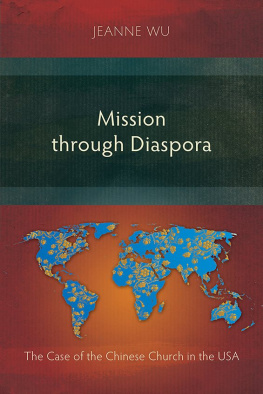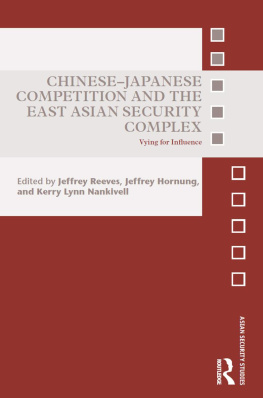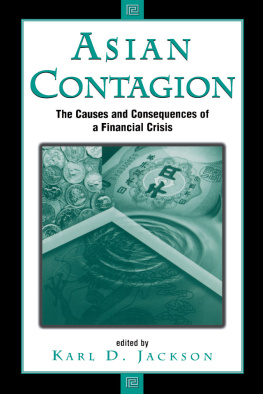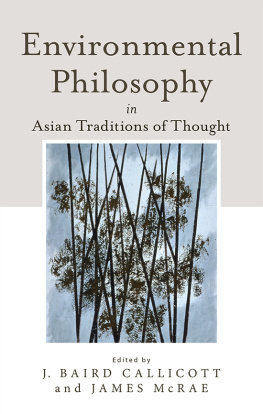
First published 2000 by Gower Publishing
Reissued 2018 by Routledge
2 Park Square, Milton Park, Abingdon, Oxon OX14 4RN
52 Vanderbilt Avenue, New York, NY 10017
Routledge is an imprint of the Taylor & Francis Group, an informa business
Copyright David Ip, Constance Lever-Tracy and Noel Tracy 2000
All rights reserved. No part of this book may be reprinted or reproduced or utilised in any form or by any electronic, mechanical, or other means, now known or hereafter invented, including photocopying and recording, or in any information storage or retrieval system, without permission in writing from the publishers.
Notice:
Product or corporate names may be trademarks or registered trademarks, and are used only for identification and explanation without intent to infringe.
Publishers Note
The publisher has gone to great lengths to ensure the quality of this reprint but points out that some imperfections in the original copies may be apparent.
Disclaimer
The publisher has made every effort to trace copyright holders and welcomes correspondence from those they have been unable to contact.
A Library of Congress record exists under LC control number: 00132845
ISBN 13: 978-1-138-72619-2 (hbk)
ISBN 13: 978-1-138-72615-4 (pbk)
ISBN 13: 978-1-315-19153-9 (ebk)
Contents
David Ip, Constance Lever-Tracy and Noel Tracy
Constance Lever-Tracy
Noel Tracy
Constance Lever-Tracy
Henry Wai-chung Yeung
David Hp
Cen Huang
David Ip
Noel Tracy
Constance Lever-Tracy
The Editors
David Ip (PhD) is currently Associate Professor in the Department of Anthropology, Sociology and Archaeology at the University of Queensland and the Director of the Masters program in Social Planning and Development. He was born in Hong Kong and educated there as well as in the United States and Canada. His main research interests are in Chinese immigrant entrepreneurs in Australia on which he has published widely. He is co-author of Impressions of Multicultural Australia. He is also actively involved in consultancy work for the Australian international development assistance bureau, AusAID and other international development organisations.
Constance Lever-Tracy (PhD) is a senior lecturer in the Department of Sociology and in the School of Political and International Studies, Flinders University of South Australia, Adelaide. She teaches and supervises student dissertations in the Universitys Masters programme in International Relations, in Hong Kong and China. She was educated at the London School of Economics, University College London and Flinders University. She has a long standing interest in international migration and in globalisation on which she has published widely and is co-author of A Divided Working Class? Ethnic Segmentation and Industrial Conflict in Australia.
Noel Tracy is Associate Professor in the School of Political and International Studies, Flinders University of South Australia, Adelaide and coordinator of the Masters in International Relations overseas programmes. He was educated at La Trobe University, Melbourne and at Hinders University. His main research interests are in the political economy of industrialisation and economic transformation of China on which he has published widely. He is author of Chinas Export Miracle (1999).
The three editors have researched together for over a decade. Their joint publications include Asian Entrepreneurs in Australia (1991) and The Chinese Diaspora and Mainland China: An Emerging Economic Synergy (1996).
The Contributors
Cen Huang (PhD) is the Director of International Programs and Partnerships in the University of Calgary. She was a research fellow at the International Institute for Asian Studies in Leiden from 19961999. Her research work is concerned with the structure and social organization of overseas Chinese invested enterprises in South China. She has done extensive fieldwork in South China and Southeast Asia in the past three years and has published widely on the research topic. Dr. Huang has also been involved in cross-cultural management of joint foreign ventures and educational reforms in China.
Henry Wai-chung Yeung (PhD) is Assistant Professor at the Department of Geography, National University of Singapore. He is a recipient of NUS Outstanding University Researcher Award 1998 and Institute of British Geographers Economic Geography Research Group Best Published Paper Award 1998. His research interests cover broadly theories and the geography of transnational corporations, Asian firms and their overseas operations and Chinese business networks in the Asia-Pacific region. Dr. Yeung has published widely on transnational corporations from developing countries, in particular Hong Kong, Singapore and other Asian Newly Industrialised Economies. He is the author of Transnational Corporations and Business Networks: Hong Kong Firms in the ASEAN Region (1998), editor of The Globalization of Business Firms from Emerging Economies (1999) and co-editor of Globalisation and the Asia Pacific: Contested Territories (1999) and Globalization of Chinese Business Firms (2000).
The editors wish to thank the Australia Research Council for a grant to themselves and to associate researcher Dr. Zhu Wenhui, to study the Chinese diaspora and the Asian crisis. This project is still in progress, but its preliminary findings have contributed significantly to this book, in particular to .
is a revised version of a paper that appeared in September 1999 in the Bulletin of Concerned Asian Scholars. The author is grateful for permission of the journal editors to make use of this material.
is a revised version of an earlier paper presented at a workshop on Challenges to the Chinese Overseas in an Era of Financial Vulnerability in the Asia-Pacific Region, University of New South Wales, Sydney, Australia, 1415 May 1999 and at seminars at the University of Sydney and the University of Bristol. Comments from participants at various occasions, in particular Connie Cheng, David Demeritt, Constance Lever-Tracy, Andy Leyshon, Liu Hong, Terry McGee, Nigel Thrift and Noel Tracy, are gratefully acknowledged. The collection of materials presented in this paper is funded by the National University of Singapore (RP960045 and RP970013). The author would like to thank Wan Meng Hao and Elen Sia for their excellent research assistance. The paper has previously appeared in the Centre for Advanced Studies Research Papers Series, No. 14, National University of Singapore, 1999.
The author of wishes to acknowledge Richard Lam and Richard Hsu for their inputs to the interviews and HAS (International Institute for Asian Studies) in Amsterdam for providing institutional support during the writing of this paper.
DAVID IP, CONSTANCE LEVER-TRACY AND NOEL TRACY
From Crisis to Recovery
In January 1997 Hanbo Steel, a large Korean chaebol, collapsed under $6 billion in debts. In mid May, Thailands baht currency was hit by a massive attack by speculators. Thereafter the crisis deepened and spread rapidly throughout the region. A panic flight of short-term capital revealed and also induced a mountain of bad debts, bringing currencies and economic activity crashing down. By the end of 1998, there was still no evidence of sustained recovery and it seemed clear that IMF rescue regimes had failed or made the situation worse. What had started as a financial and currency crisis had devastated the real economy of the region, as the costs of imported food and necessary inputs for production and of debt servicing and repayment soared and as new credit for productive activities dried up or became phenomenally expensive (Krugman, 1998; Sachs, 1997). Poverty and unemployment increased rapidly, and in that year throughout East and Southeast Asia, only China and Taiwan and (barely) Singapore avoided negative growth (








